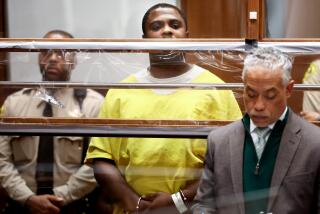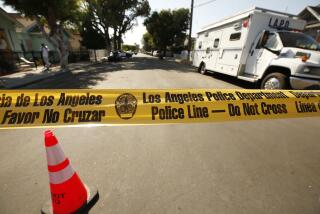Security Guard Cleared in Olympic Bomb Case
- Share via
ATLANTA — Three months after a pipe bomb shot fiery shrapnel through the revelry of the Olympic Games, the Justice Department on Saturday formally cleared security guard Richard Jewell as a suspect.
The move first surfaced in a letter from U.S. Atty. Kent Alexander to Jewell’s lawyer. It came after weeks of mounting signs that the FBI lacked evidence linking Jewell, the only named suspect, to the attack in Centennial Olympic Park that killed one woman and injured more than 100.
“We are overjoyed,” said Jack Martin, one of the attorneys who has been pressing authorities to exonerate the 33-year-old Jewell and issue an apology.
The letter contained no apology, but Alexander wrote that “based on the evidence developed to date, your client, Richard Jewell, is not considered a target of the federal criminal investigation into the bombing on July 27, 1996, at Centennial Olympic Park.
“Barring any newly discovered evidence, this status will not change,” it continued. The letter also said authorities hope that Jewell now will cooperate with the investigation as a witness.
In a separate statement, Alexander noted that Jewell and his mother, Barbara, had “regrettably also endured highly unusual and intense publicity that was neither designed nor desired by the FBI and, in fact, interfered with the investigation.”
Jewell’s attorneys said they would consider the letter an apology. They also said Jewell now would begin putting his life back together.
Jewell said little to reporters at his apartment, other than that “the first step was a long process.” He told them he would have more to say at a news conference Monday.
Jewell hasn’t worked since the bombing and, until recent weeks, rarely left his home. A toll-free telephone number and a fund set up to accept donations raised about $2,500 for living expenses. The number also brought hundreds of calls of support--and some deriding calls--said Lin Wood, another of Jewell’s attorneys.
Immediately after the attack, Jewell was hailed as a hero for spotting the suspicious knapsack that contained the bomb and for helping to clear the area. But he was named as a suspect three days later.
For more than two months, the FBI agents watched Jewell’s every move, basing their suspicions primarily on theories that Jewell matched the psychological profile of a person who might plant a bomb in order to look like a hero, law enforcement sources said. Reporters camped outside the apartment he shares with his mother. His name and likeness were broadcast worldwide.
*
But in recent weeks, the FBI had ended its surveillance of Jewell and returned confiscated belongings, including his gun collection. At the same time, it began gradually shifting its focus to other suspects, the sources said. The agency also has begun re-interviewing witnesses about what they saw in the park that night.
“We probably will never know who [placed] that bomb,” said Robert Sigler, a criminal justice professor at the University of Alabama who has watched the case. Pipe bomb investigations are notoriously difficult to solve, he said.
But as the focus of the investigation shifts away from Jewell, questions linger about the way the FBI and the news media handled the case: Did authorities deliberately leak Jewell’s name to the news media, as his attorneys allege? And if so, why?
Did news organizations act responsibly in naming and delving into the background of a man who had not been charged?
And if Jewell became a suspect, as authorities acknowledge off the record, because he appeared to fit the psychological profile of a bomber, did investigators work diligently enough to determine that he in fact fit the profile before seeking a search warrant?
An FBI spokesman declined to discuss the case Saturday, but the agency has said it has begun an investigation into who leaked Jewell’s name.
Jewell’s lawyers, who have threatened to sue the FBI, claim that the agency never had a legitimate reason to target him. Rather, they contend that Jewell was publicly named because of pressure on authorities to calm a fearful public.
“Clearly a lot of powerful interests were involved who wanted to find a quick and easy answer to the dilemma presented by the bombing,” Wood said.
While it is not standard procedure for the Justice Department to issue a letter declaring that the target of an investigation is no longer a suspect, it is not without precedent in high-profile cases.
*
In 1990, an Alabama man who was investigated for using pipe bombs to kill a federal judge and a civil rights attorney was given such a letter. He now has a $150-million lawsuit pending against the FBI, alleging that the agency never had legal grounds for searching and confiscating his property.
Jewell’s lawyers are watching that case carefully. In addition to possibly filing their own lawsuit against the FBI, Wood said he plans to file suits in November against Cox Enterprises Inc., owners of the Atlanta Journal-Constitution, and against NBC News and its evening news anchor, Tom Brokaw, for their reports on the case.
He faulted the newspaper, the first to name Jewell as a suspect, for erroneously reporting that Jewell had sought out publicity and otherwise fit the profile of a person who might plant a bomb in an effort to gain praise.
Brokaw and NBC would be sued for stating on the air that authorities already had enough evidence to arrest and indict Jewell but were holding off until they were sure they had enough to convict him, Wood said.
The media organizations have stood by their reporting, saying it was based on what investigators told them at the time.
*
Wood said he is also investigating whether officials of the Atlanta Committee for the Olympic Games played a role in releasing Jewell’s name to the media or in putting pressure on authorities to quickly name a suspect.
Lyn May, the Olympic spokeswoman for security matters, scoffed at the idea that Olympic organizations could have influenced the FBI to move more quickly than the investigation warranted. And, she said, anyone connected to any one of the several state, federal and local law enforcement agencies involved with the investigation may have leaked Jewell’s name, adding: “I would be surprised if it was a deliberate leak. We were pretty busy.”
From the moment Jewell’s name became known, reporters began poring over his background, examining his personal foibles, employment history and arrest record. He was described as an “overly zealous” security guard by his former employer, a rural Georgia college. He had wrecked a police car, supposedly during a chase, while serving as a deputy sheriff. Back in private security, he was charged with impersonating a police officer after he tried to arrest a noisy couple in a hot tub at the apartment complex where he worked.
And before going to work for an Olympics-related security firm, he reportedly had told acquaintances that he wanted to be in the middle of any calamity that might occur during the Games.
Such details caused the FBI to declare Jewell their No. 1 suspect, the law enforcement sources said. And the thousands of journalists covering the Games, under intense competitive pressure to be first with the story, treated these slivers of information as evidence that Jewell fit the profile of a bomber, Wood charged.
Psychological profiles are well-regarded tools that aid in the initial stages of investigations by identifying likely characteristics of criminals. They have helped lead to the arrests and convictions of high-profile criminals such as serial killers Ted Bundy, John Wayne Gacy and David Berkowitz.
*
But in this case, Jewell’s lawyers contend, their use resulted in the wrong man being targeted and smeared. Sigler, the Alabama professor, agreed.
Jewell is a far less likely suspect, Sigler said, upon examination of the lack of motive and the apparent lack of physical evidence. Also, Jewell would have had to walk several blocks to a telephone to place a mysterious 911 warning call to the police and then return to the park in time to point the device out to authorities.
Throughout the investigation, law enforcement officials have warned that no one should expect a speedy resolution to the case. They noted that it took years to make an arrest in the Unabomber case.
But there is another, perhaps more apt comparison to the Olympic bomb investigation: In 1990, after pipe bombs killed an Alabama federal judge and a civil rights lawyer in Georgia, federal investigators zeroed in on Robert Wayne O’Ferrell, an Alabama junk dealer.
*
Under the media’s glare, agents searched his property, confiscated his belongings, followed his every move. They even pumped out his septic tank so that the contents could be examined for evidence. Before his ordeal was over, O’Ferrell said in an interview, the strain destroyed his marriage and he was hospitalized with a bleeding ulcer. Unable to work, he lost his home.
“I came close to suicide four different times,” he said.
Eventually, another man was arrested and convicted. O’Ferrell never received an apology, but he got a letter informing him that he no longer was a suspect.
Jewell’s attorneys look on O’Ferrell’s experiences with interest not only because of the parallels but because of the $150-million lawsuit he filed against the FBI.
O’Ferrell contends that authorities made a public spectacle of the investigation so that Walter Leroy Moody, the man they had already identified as the likely culprit, would feel less pressure. While all of the public attention was being focused on O’Ferrell, he says, the authorities were secretly watching Moody, waiting for him to slip up.
The FBI persuaded a federal magistrate to issue the search warrant based on the contention that a typewriter O’Ferrell used in a 1988 federal lawsuit was the same one used by the bomber to type labels attached to the devices. O’Ferrell’s current lawsuit against the FBI maintains that the typewriters were different and had clearly different styles of type.
*
“Everything the FBI done to me was a lie,” O’Ferrell contended. “It was illegal because they got the search warrant illegally.”
Winning such a lawsuit against a law enforcement agency is difficult, experts say. But Jewell’s attorneys are raising similar questions about the validity of the search warrant in the Olympic bombing case.
Affidavits used to secure the warrant “are full of false statements, half-truths and slanted facts,” said Wood. In addition, he said, the affidavits exclude information that pointed away from Jewell.
The affidavits have been kept sealed, although defense attorneys have been allowed to see portions of them. They cannot divulge specific contents, but Wood said: “I don’t believe [the FBI] ever had any evidence pointing to Jewell on which they could legitimately base a warrant to search his property.”
Last week, only three days before Jewell received the letter clearing him as a suspect, a federal judge, acting in a lawsuit filed by media organizations, ordered the release of the affidavits.
Based on the FBI’s decision to return Jewell’s confiscated belongings and curtail surveillance, U.S. District Judge J. Owen Forrester declared the security guard a “former suspect” and concluded that “the Jewell chapter of the Centennial Olympic Park bombing investigation has been closed.”
The judge did not have the authority to officially clear Jewell nor end the investigation.
More to Read
Sign up for Essential California
The most important California stories and recommendations in your inbox every morning.
You may occasionally receive promotional content from the Los Angeles Times.













